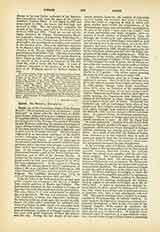

Linde, JUSTIN TIMOTHEUS BALTHASAR, FREIHERR VON, Hessian jurist and statesman, b. in the village of Brilon, Westphalia, August 7, 1797; d. at Bonn during the night of 8-June 9, 1870. His father, who was a barrister, died when Justin was only three years old; this occurrence, and the fact that the widow had to support four children in war times, darkened in a measure the youth of the unusually talented boy. After he had completed his gymnasium studies at Arnsberg (1816), he devoted himself with great zeal and success to the study of jurisprudence at the universities of Munster, Gottingen, and Bonn. In the last-mentioned he received the doctorate (1820), and qualified in 1821 as university tutor. Two years later he was called to Giessen, where, as extraordinary (1823), and subsequently as ordinary professor of law (1824-9), he attracted numbers of students, and became distinguished through his learned publications. In 1829 he was called to Darmstadt, as ministerial counsel (Ministerialrat), and was later (1832) named director of the Board of Education. The year 1833 found him Chancellor of the University of Giessen. Soon after (1836) he was named privy councillor, and 1839 brought him a patent of nobility. After repeated requests, he was permitted to retire with a pension in 1847. In 1848 he was a member of the Frankfort Parliament and in 1850 of the Parliament of Erfurt, and from the latter year he acted as Prince Lichtenstein’s ambassador to the German Diet—from 1863 he also represented the elder line of Reuss and Hesse-Homburg—until its dissolution in 1866. The wreck of his political ideals, espoused by him with great warmth, was not without effect upon Linde’s mind and temper. His former almost inexhaustible capacity for work was broken, as well as his wonderful cheerfulness. He withdrew almost entirely to his country seat, Dreys, and during a visit to one of his sons at Bonn he was carried away by a stroke of apoplexy in 1870.
In his younger days he was, in politics, friendly to Prussia (cf. his “Rede fiber den Geburtstag des Konigs von Preussen”, Soest, 1816), and in religion somewhat Josephinistic. Gradually, however, he developed into a strong particularist, as well as a zealous champion of the rights and claims of the Church, although he did not succeed in winning the entire confidence of the strict Catholic party. To Linde is due the establishment of the Catholic theological faculty in the University of Giessen, in which many excellent men labored—among others the well-known ecclesiastical historian Riffel (q.v.), who later quarrelled with Linde. For the erection of a church in the same place especial thanks are due to him. His orthodoxy is unquestionable. Linde’s numerous official reports have still to be collected from the archives; most of his pamphlets are forgotten, although many are of permanent value. The best collection of his intellectual productions is given by Schulte in the “Allgemeine deutsche Biographie”, s.v. “Linde” (XVIII, 671). The most important and extensive of these works are: “Abhandlungen aus dem Civilprozess” (2 vols., Bonn, 1823-9); “Lehrbuch des deutschen gemeinen Civilprozesses” (7th ed., Bonn, 1850); “Archiv fur das offentliche Recht des deutschen Bundes” (4 vols., Giessen, 1851-63).
PIUS WITTMANN

